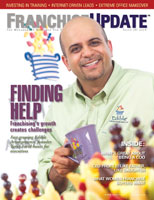Recent Amendments to Franchise Regulation in Spain
During the last few years, franchising has experienced an impressive growth in Spain, from 634 franchise systems in 2002 to almost 900 in January 2006, with over 54,000 franchised outlets now open. Accordingly, having access to accurate and relevant information regarding franchisors is very important for a growing number of prospective franchisees, consumers and future franchisors.
Moreover, as the number of franchised businesses in Spain grows there is a need to make sure that other business forms are not caught up in the franchise registration system unnecessarily. Despite the fact that Spain's existing franchise legislation defines the concept of a "franchise", legislators have expressed concerns that some contracts that do not fall within the scope of such definition, such as exclusive distribution agreements and trademark licence agreements, were sometimes referred to and categorized as "franchise agreements".
For these reasons, the Spanish Ministry of Industry, Tourism and Commerce passed Royal Decree no. 419/2006 on April 7, 2006, which amends Royal Decree no. 2485/1998, of November 13, regarding the regulation of franchises in Spain and the Franchisors Registry.
Royal Decree no. 419/2006, of April 7 (the "Decree") does not substantially alter the regulation of franchising under Spanish Law; rather the new regulation is intended to make sure that the Franchisors Registry remains a relevant and useful instrument for prospective franchisees, consumers and future franchisors.
One of the main features of the new regulation is that, apart from the existing requirements for qualification as a franchisor (i.e. a franchisor grants franchisees the right to exploit a franchise system in return for direct or indirect consideration), the following requirements must be met for a business to qualify as a franchisor:
- The business subject matter of the franchise has been developed with "sufficient success and experience" by the franchisor. Unfortunately, the concept of "sufficient success and experience" is not defined in the regulation.
- The know-how must be secret, substantial and identified (according to the definition of "know-how" under European Community law).
- The parties may agree that the franchisor has the right to supervise the business of the franchisee.
- A master franchisee may act in place of the franchisor in a particular market.
Royal Decree no. 419/2006 clarifies the concept of "franchise", and it declares that exclusive distribution agreements shall not necessarily be considered to be franchise agreements. Exclusive distribution agreements are defined as agreements under which a company undertakes to purchase, under certain conditions, products that are usually branded, to another company which grants the former some form of exclusivity in a certain area, and to resell them (under certain conditions too), as well as to render assistance to consumers once the sale has been completed. The Decree also excludes certain business relationships from the definition of a "franchise", such as licences for manufacturing, trademark licences for a particular area, technology transfers and signage licences.
The Decree also requires that additional documents and information be submitted before the Franchisors Registry in order for a registration to be completed. The documents and information filed for registration of the franchisor at the Franchisors' Registry shall now include (in addition to the information required under the existing regime):
- the time period during which the franchisor has developed its franchise business and the total number of franchised and company-owned outlets;
- master franchisees must file a master franchise agreement or trade mark licence agreement evidencing their right to use the franchisor's marks;
- a power of attorney must be submitted if a representative is acting on behalf of a franchisor; and
- all documents filed by foreign companies must be filed in both Spanish and the language of the franchisor.
Royal Decree no. 419/2006 maintains the obligation to update every January the information of any closing or opening of any company-owned or franchised outlets in Spain that occurred during the preceding year. If openings or closings have taken place, the Franchisor must inform the Registry as well. Otherwise, the Registry may delete the Franchisor from the Registry. The Registry may also cancel a registration at the request of the franchisor or following a court decision.
Under the Decree, franchisors may also submit voluntary information, such as:
- quality control certificates and identity of the regulatory body/rules governing such certificates;
- subscription to dispute-resolution systems for conflicts between franchisor and its franchisees;
- agreements to be bound by codes of ethics in the field of franchising;
- subscription to consumer arbitration systems to solve conflicts regarding complaints of consumers; and
- other details which may be deemed to have public interest.
Royal Decree no. 419/2006 declares that the Registry shall include a sub-registry for consolidated franchisors. In order to be considered "consolidated", franchisors will have to meet the following requirements:
- Franchisor must have at least two franchised outlets that have each been open for at least two years; and
- Franchisor must have at least four total outlets, at least two of which must be franchisor-owned.
The Decree does not redefine the term "franchise" or replace any previous registration requirements, rather it provides clarity as to which relationships will be deemed to be "franchises" and expressly excludes certain relationships that had often been confused with franchises. Royal Decree no. 419/2006 also expands the types of documents necessary to complete a franchisor's registration. However, in practice, most of the new documents to be filed with the Registry (i.e., power of attorney, original and translated documents, agreement evidencing licence of rights in favour of master franchisee), were commonly requested by the Registry, so this new regulation effectively conforms the statute's requirements to the common practices already followed by the Registry.
Some in the Spanish franchise community were disappointed that Royal Decree no. 419/2006 did not provide clear guidance on certain aspects of Spanish franchise law (for example, what enforcement measures will be taken against those not complying with Spanish franchise regulations?); however, the new regulation has been generally well received and should be a positive addition to Spain's franchise regulatory scheme.
Laura Montoya Terán is a partner at Gómez-Acebo & Pombo Abogados, S.L .in Madrid, Spain (www.gomezacebo-pombo.com). She can be reached at lmontoya@gomezacebo-pombo.com or Tel: +34 91 582 91 00.
Share this Feature
Recommended Reading:
Comments:
comments powered by DisqusFRANCHISE TOPICS
- Multi-Unit Franchising
- Get Started in Franchising
- Growth
- Operations
- Open New Units
- Leadership
- Marketing
- Technology
- Legal
- Awards
- Rankings
- Trends
- Featured Franchise Stories
FEATURED IN

Franchise Update Magazine: Issue 3, 2006






 The franchise listed above are not related to or endorsed by Franchise Update or Franchise Update Media Group. We are not engaged in, supporting, or endorsing any specific franchise, business opportunity, company or individual. No statement in this site is to be construed as a recommendation. We encourage prospective franchise buyers to perform extensive due diligence when considering a franchise opportunity.
The franchise listed above are not related to or endorsed by Franchise Update or Franchise Update Media Group. We are not engaged in, supporting, or endorsing any specific franchise, business opportunity, company or individual. No statement in this site is to be construed as a recommendation. We encourage prospective franchise buyers to perform extensive due diligence when considering a franchise opportunity.